Chet Gulland had two cups of coffee in his left hand and a car seat with a baby in it in his right, so he needed a little help with the door as he exited the Grey Barn & Farm’s store to join his partner, Kendra Salvatore, and their three-year-old daughter at a nearby picnic table. The view from the table was bucolic: rolling pastures, stone walls, gray-shingled barns, a spreading shade tree, and a chicken coop on wheels. A trio of young people who arrived on bicycles had spread a blanket on the grass. Gulland’s and Salvatore’s daughter was busy extracting the chocolate from her fresh croissant, unbothered by the chickens and guinea hens that strutted and pecked around the table area, completing the pastoral scenario.
The family lives in upstate New York, Salvatore explained, where there are many farms, but none is like the Grey Barn. “There’s just something about it that we really love.” Whenever they are on the Island – Salvatore’s mother lives in Aquinnah – they stock up on Grey Barn products to take home to New York: sourdough bread, Eidolon cheese, ground beef, pork chops.
“It’s just another level of quality,” Gulland said. “An obsessive attention to detail.”
The two are not alone in their appreciation for the Chilmark outpost, which sources products to many local restaurants and stores, and serves customers year-round at its state-of-the-art farm stand. The farm’s award-winning cheeses, made on-site from its certified organic milk, are sold both on- and off-Island and are available by mail order through a national distributor. In 2021 alone, the farm won a gold medal at The World Cheese Awards and was named one of the “Best Cheese[makers] in America” by Food & Wine magazine. Especially lauded is the farm’s first, flagship cheese, Prufrock, a stinky, washed-rind favorite that draws its name from a poem by T. S. Eliot. The bakery’s goods, too, are cherished: on weekend mornings, a line of bread- and pastry-seekers often forms outside the farm stand before it opens.
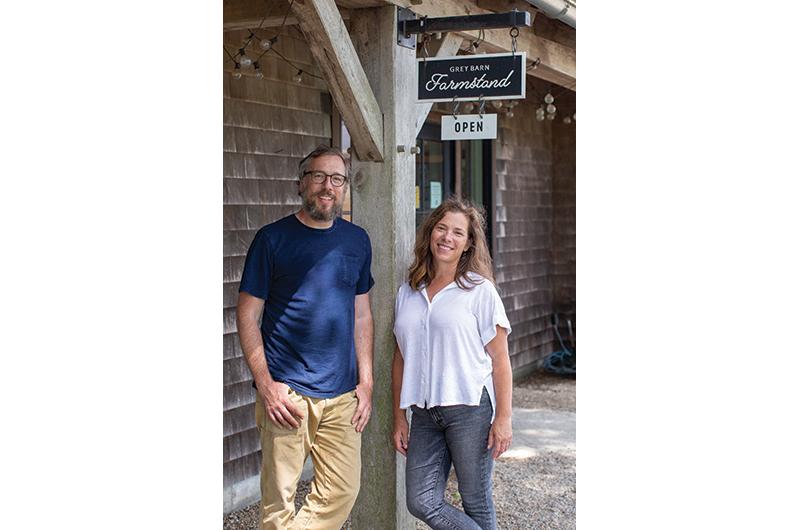
By any measure, the Grey Barn, founded fifteen years ago when Molly and Eric Glasgow took over the agricultural lease of Rainbow Farm in Chilmark, is a brilliant success. But there have been challenges along the way – some as devastating as a catastrophic fire in the creamery, others as subtle as navigating local resentment of moneyed newcomers selling relatively high-priced goods ($29 for a wheel of Prufrock) in an upscale farm stand. For some, the Grey Barn became an emblem of a rapidly changing Vineyard when the new owners arrived on the Island. The chatter occasionally continues to this day.
“Chilmark gentleman farmers,” one reader sniffed in the online comments of a December 2023 Vineyard Gazette article about the farm. Another chuckled anonymously over the pristine landscaping in Grey Barn’s public areas. “Real farms can’t afford nor would even think of this. These are Disney inspired farms looking to grow their social media influence.”
The Glasgows express a certain weariness with such criticism, and say they have learned to brush it off. People have “this glorified idea of farming,” said Molly. “If you came and worked with us for a week or a month, you would see that, yes, we mow the grass at our farm stand and we have pretty plants at the farm stand, but you cross over the wall and it’s a farm, and it’s hard work.”
“You have people say, ‘Oh, it’s fancy. It’s not for Islanders,’” added Eric. “I am sorry that we can’t sell a loaf of bread for $4, but then we wouldn’t be able to pay people a living wage.”
Part of the early resistance to the farm from some quick-to-rile old-school Islanders no doubt stems from the fact that the Glasgows were unlikely candidates for a dairy farm startup. Eric, educated at the University of Chicago, had just left a career as an oil trader. Molly, trained as a sculptor at the Pratt Institute in New York, had worked as an art director at the Hearst media company and, more recently, as a full-time parent. Their sons, Noah and Jake, were six and four. They lived in London. They had zero experience in farming.
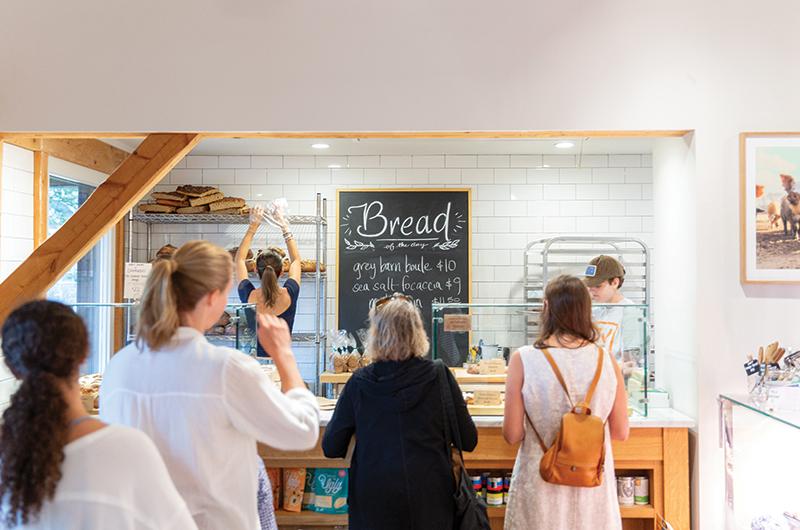
But they were ready for a change. They had vacationed on the Vineyard and loved it. They wanted their kids to have “some Americanness,” as Eric put it. Avowed foodies, they were taken with a beautiful farm in the Cotswolds: Daylesford Organic, founded by Carole Bamford, a baroness. “Everything they had in the store was from their farm,” Molly recalled. “All the fruit was from their farm. All the meat, all the cheese. I had never experienced that before and I was just blown away by it.”
Soon after, they learned about a farm for sale on the Island. “I was like, ‘What if we bought this farm?’” Eric said, his words tumbling fast. “‘And what if we turned it back into a working dairy farm? And what if we made cheese, and we made charcuterie, and we had a bakery?’ It just snowballed.”
The Glasgows bought the five-acre property that houses the barn and farmhouse in 2009 and took over the previous owner’s thirty-one-year lease from the Trustees, a land conservation organization that owns ninety-nine acres of surrounding farmland. By the spring of 2010, they had three cows and were soon selling raw milk from a refrigerator on the porch. They enrolled their sons (now in college) in the Chilmark School and built a new home on the site.
The pair began building a cheesemaking operation from scratch. Molly went to cheesemaking school and, at first, oversaw the operation. But after several bouts of illness, she was diagnosed with ulcerative colitis. She had to step back from making cheese – or eating it, for that matter.
Then came the fire during Memorial Day weekend in 2013. The brand-new creamery was destroyed, and the cows had to be sent off-Island. The Glasgows doubled down and rebuilt. It took almost a year to get going again.
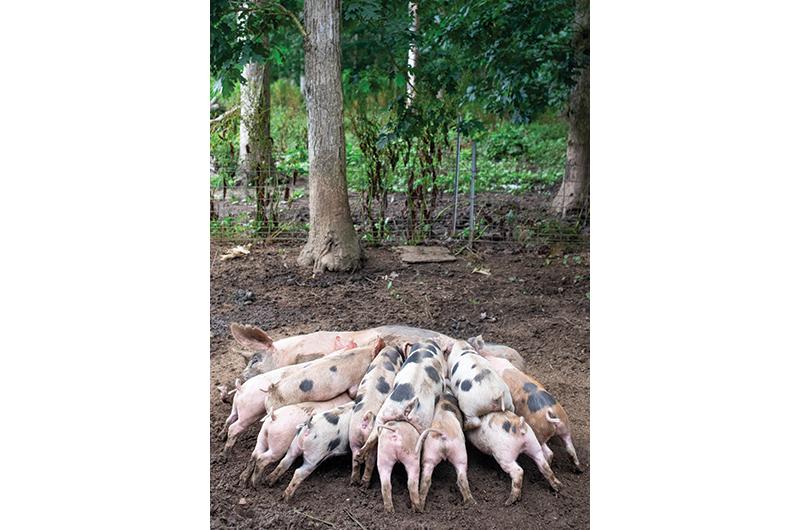
They hired a master cheesemaker, and Prufrock was born. As the reputation and diversity of their cheeses grew, they added to the herd, built a farm stand, added and then subtracted vegetable farming from the business, added a bakery in 2019, and two years later expanded their farm stand. Last year, the creamery produced 40,000 units of cheese. The goal for 2024 is to increase that by 25 percent.
For all the growth that the farm has seen over the years, Molly and Eric continue to remain hands-on. Molly, for her part, oversees almost all aspects of the design and public-facing elements of the farm, while Eric works with contractors and providers. About every other Wednesday, he heads off-Island on an early-morning boat to make his rounds: bringing cheese to a distribution site, picking up meat and animal product to bring back to the Island, or delivering product to a producer who in turn will make sausage or liverwurst. He usually doesn’t make it back until night.
“Eric works his butt off,” said Lauren Lynch, president of the Martha’s Vineyard Agricultural Society. “The Island is fortunate that he was able to bring his desire to farm to this Island.”
Many people don’t understand the costs of starting a farm on the Vineyard, she continued. “The land challenges can be really big and the cost of everything else here is that much more expensive.”
Plus, dairy farming is one of the most difficult kinds of farming, said Julie Scott, executive director of the nonprofit Slough Farm in Edgartown, which itself is a high-end farm that has an educational mission. Her husband, Laine, worked at Grey Barn for five years, she said. Rain or shine, winter or summer, the cows need milking. There is no off-season. “It’s not for everybody. There’s no breaks, 365 days a year. It’s just constant.…
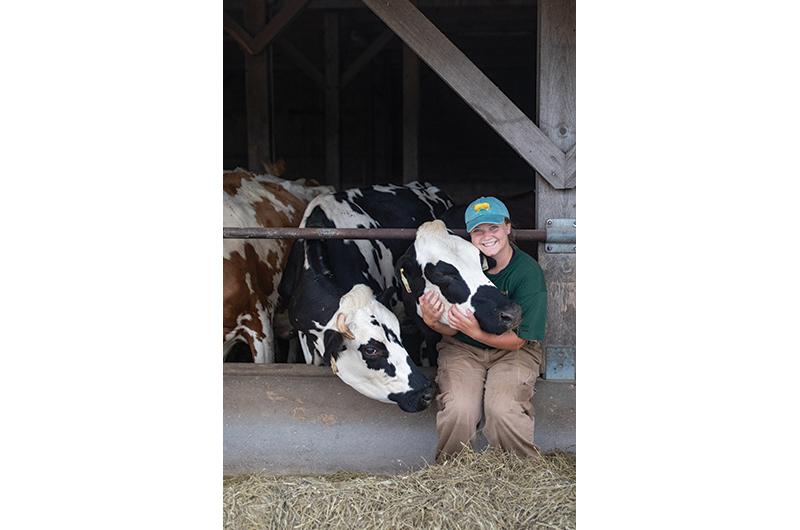
“I’m grateful that people who had the ability to go wherever they wanted to and do whatever they wanted to do chose to be dairy farmers on Martha’s Vineyard.”
While the Glasgows faced a steep learning curve in nearly all aspects of farming, one of the biggest lessons they soon learned was that farming requires many hands to make it work. Over the years, the farm has said hello and goodbye to countless farmhands – like many businesses on the Island, the Glasgows say their biggest challenge is supporting and retaining staff. Currently, the farm maintains about seventeen year-round employees, with an additional eight to ten in the summer. Many of the employees live in the farm’s eight bedrooms of workforce housing, and the Glasgows are looking to build more.
Chief among the many workers is Olympia Zgonis, who serves as director of operations, in charge of staffing, brand development, and planning and overseeing tours and tastings. She has been with the farm since 2021, when a pandemic-era retreat to the Island from Brooklyn blossomed into a life commitment.
As head of herds, Olivia Kruczynska is in charge of forty-five cows, 250 laying hens, and four breeding sows and all their piglets (eighteen of them on the day of my visit). I watched her expertly manage the 6:30 a.m. milking, then spray down the milking stalls, floor, and walls, and flush the pipes – selling raw milk requires a high level of sanitation in the milking parlor. She then headed to the calf pens with two buckets of colostrum-rich milk she had reserved for the newborns. One calf, a day old and the size of a large Labrador retriever, had escaped and was standing outside the barn, lowing longingly at its mother through a steel fence.
Kruczynska roped the calf and wrangled it back into its pen. To wrestle a bottle of milk into its mouth, she had to clamp the bucking calf’s head between her legs. Born during the night, it managed to nurse – something generally discouraged in dairy barns – before the birth was discovered. Now it didn’t want to take the rubber nipple. But Kruczynska hung on; eventually it drank.
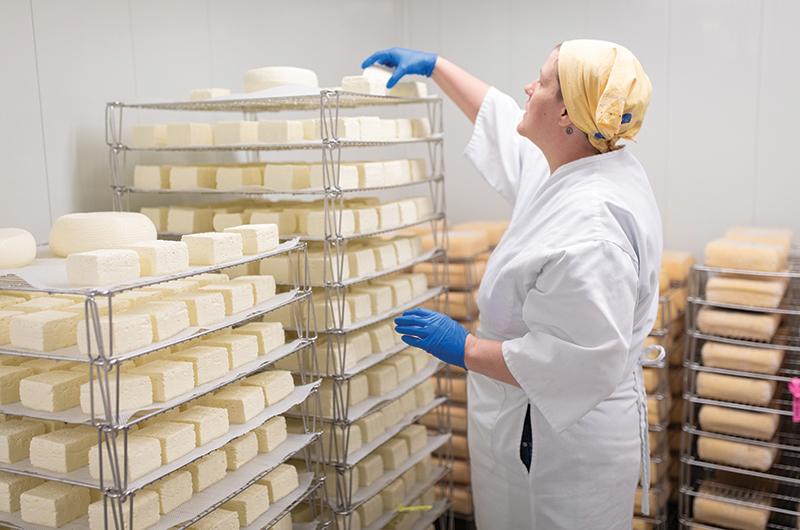
It’s all in a day’s work to Kruczynska. Her project the prior day was castrating piglets. Later in the summer, she would spend a good portion of her time moving fences to constantly guide the cows to new pasture, a sustainable grazing practice that is part of Grey Barn’s commitment to regenerative agriculture.
Creamery manager Rachel Kleine talked to me in the creamery, adjacent to the milking parlor, while her colleague David Aeschliman bathed a batch of Prufrock. The squares of cheese bobbed in a huge vat of brine. “Washed rinds are very tricky,” Kleine explained. “Every place has its own microclimate with the molds and yeasts that are natively here. This place has found the magic balance that keeps the bloom off the rinds.”
Kleine had been working with cheese for twelve years at dairies in Missouri and San Francisco. What drew her to Grey Barn in February of 2023 was the chance to work on a diverse lineup of cheeses, from the cheddar-y Banneker to the creamy Eidolon to the blue-veined Bluebird and its aged cousin, Bluebird Reserve. “I was excited to do a blue cheese!” Kleine said.
Across an expanse of grass, Heather Pepper was busy managing the bakery. It’s located in the original 1910 gray barn for which the farm is named. Fourteen years ago, the Glasgows lifted the barn to make room below for cheese caves.
“Our main ethos is using stone-milled flour,” Pepper said of the operations she has overseen since July 2023. “We have such a close relationship with our millers and with our New England farmers,” she said. “I’m proud to be on the end of that food system.”
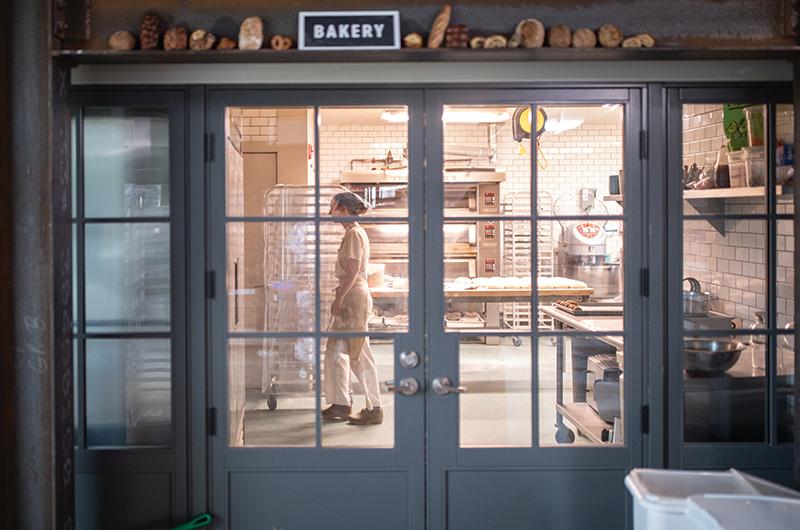
On this Thursday morning, two of her colleagues were braiding challah while Pepper oversaw the pastries. “Everyone here is really passionate and committed to their craft,” she said.
Both Glasgows are quick to credit their staff, past and present, as well as other Island farmers, for teaching them what they needed to know and helping to shape the contours of the farm. Recounting the Grey Barn story, the Glasgows often mention innovations that originated with staff suggestions, such as bringing in a variety of breeds to diversify their herd or committing to stone-milled flour. “We have our staff, and there’s a certain malleability to how we approach certain questions based on who’s here and what they really want to do,” Eric said.
Over the years, the Glasgows have also became known as generous contributors to the Island community, whether by donating surplus bread to the Island Food Pantry, hosting field trips and farm tours, or selling meat at a discount to the schools for children’s lunches.
As the years of hard work and community involvement began to add up (and as the number of cheese lovers Island-wide who are addicted to Prufrock and its siblings mounted), many change-averse Islanders – as well as scores of summer residents and visitors – began to rally support for the farm.
That support was on full display in 2022 when Eric, frustrated after years of delay in his efforts to secure a promise from the Trustees that the farm’s agricultural lease will be renewed in 2040, took his complaint to the pages of the Gazette. In a letter to the editor that ran under the headline “Lack of Trust,” Eric argued that inaction by the Trustees was forcing the couple to indefinitely postpone their plans to build new workforce housing.
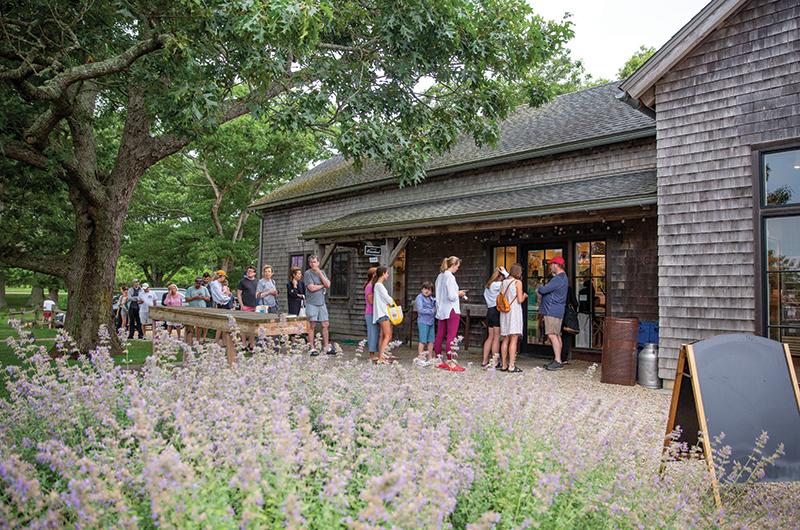
Outrage ensued in the online comments. “They have become an island tradition. It’s time to support these people who put such hard work into making MV an even more special place,” commented Ed Lehrman of West Tisbury. Noted Island author Geraldine Brooks scoffed, “Trustees? What a misnomer! This is shameful dereliction.”
The Trustees declined an interview for this article, but sent a written statement, which read, in part, “The Glasgows have built a successful, thriving agricultural business with the 99 acres they lease from The Trustees. We are pleased to support them and have been working together over the last year to strengthen our relationship and the future of the Grey Barn Farm through a new, extended lease, which we are working to finalize.”
Today, the Glasgows say that communication with the Trustees has improved, and they are hopeful about the future of their lease. Eric credits, in part, the public outcry that followed the publication of his letter.
That isn’t to say it has been smooth sailing ever since. A protracted dustup with Chilmark officials over the location of the Grey Barn’s greenhouses ended with the farm abandoning its vegetable operation at the end of 2022. Today, the Grey Barn sells vegetables and plant starts from nearby Milkweed Farm, and Molly gardens primarily for her family.
Then, in July of this year, the farm once again made the news when Molly protested the Chilmark select board’s decision to allow Iggy’s Bread, an off-Island bakery, to operate seasonally in Menemsha. “You don’t care about the farmers here,” she said, before hurling an expletive at the select board. The incident lit up comment sections with renewed calls about their own outsider status – even after fifteen years in operation. Molly, for her part, quickly issued an apology and the hubbub died down.
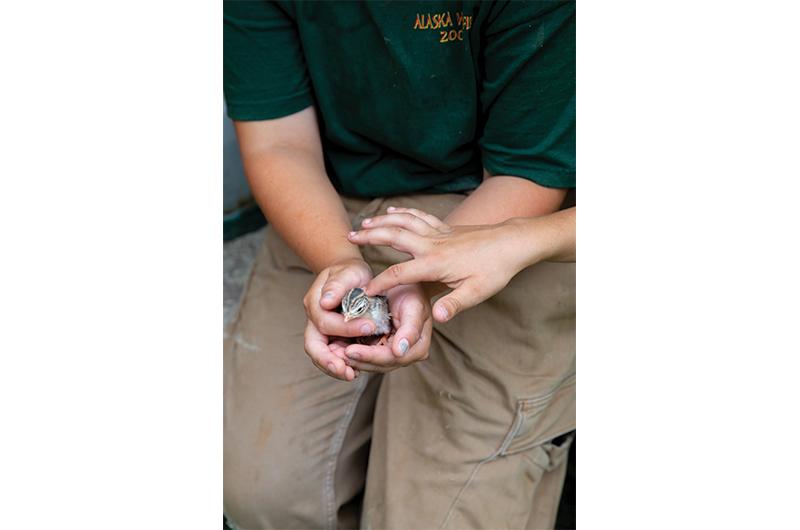
As of this writing, however, the Grey Barn, along with other Chilmark farms, are at a standstill in negotiations with town officials that began last winter about the admissibility of events. Farmers say some amount of events, such as farm-to-table dinners, tours, tastings, or occasional food truck pop-ups, serve an educational purpose and create a needed stream of revenue. And yet to critics, the specter of such gatherings raises visions of traffic, noise, and unseemly activities, even bouncy castles.
“Nobody wants that,” Eric said acerbically about the potential proliferation of farm-based bouncy castles. “I think it’s fair to say the towns can be a little bit small-c conservative in their view,” he said. “They just want nothing to change as long as possible.”
In the end, any farm – whether scruffy and hardscrabble or manicured and Instagram-friendly – has to grow and change in order to survive. The Grey Barn, perhaps, simply recognized the potential of an upscale Island farm earlier than most. The Glasgows and their staff have continued to pivot, expand, and innovate along the way.
When the farm turned ten in 2019, they celebrated by introducing a new cheese: Bon Anniversaire. Since then, they have weathered the pandemic, which required temporarily reimagining the farm stand to accommodate social distancing. They began hosting certain small-scale events, such as public tours, cheese tastings, small dinners, cookbook signings, and even quirky gatherings such as “Caroling for Cows.” In May of this year, the farm served as a location for a scene in the Netflix series based on Judy Blume’s popular book Forever.
To some, this modern mix of elements may be a far cry from farming on the Vineyard as it used to be – back when legendary dairy farmer Fred Fisher Jr. commanded a crew of heifers, and his wife, Muriel, handled the milk deliveries out of Nip ’n Tuck Farm in West Tisbury. It’s arguably even a far cry from how it is now over at the Island’s other extant dairy farm, Mermaid Farm in Chilmark, which sells its raw milk, yogurt, meat, and a small selection of cheeses from an unstaffed, understated stand.
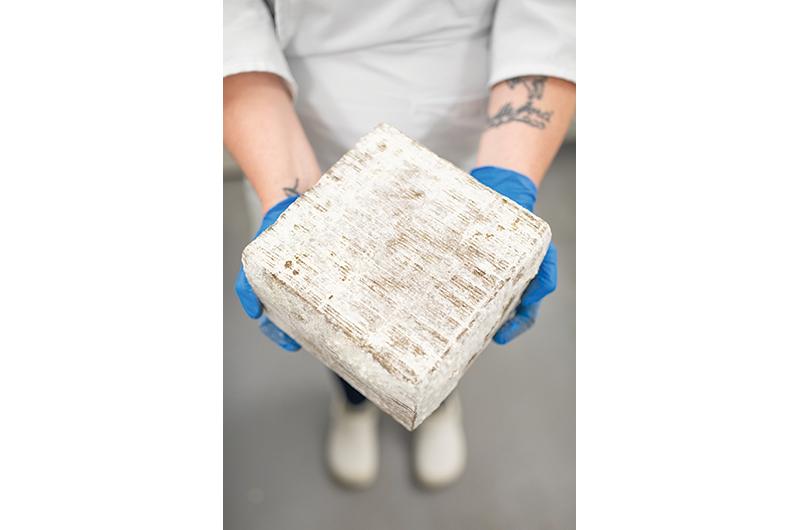
Then again, since the Grey Barn set up shop, plenty of Island farms have undergone drastic change, and are continuing to evolve at a rapid pace. The sleek nonprofit, education-focused Slough Farm opened up in Katama, providing produce to schools, libraries, and the Island Food Pantry. Beetlebung Farm in Chilmark changed hands from an old Island family to a deep-pocketed investor, and expanded its offerings, buildings, and aesthetics in the process. Even Edgartown farming mainstay Morning Glory Farm has begun catering to a more upscale clientele.
The path forward for the Glasgows, then, likely involves continuing what they’ve been doing, whether that’s leading the way or swimming against the tide. After all, what started off as a unique new adventure is now a way of life.
“I don’t know what on earth life would’ve been like if we hadn’t [started this farm],” said Molly. “I can’t even imagine.”

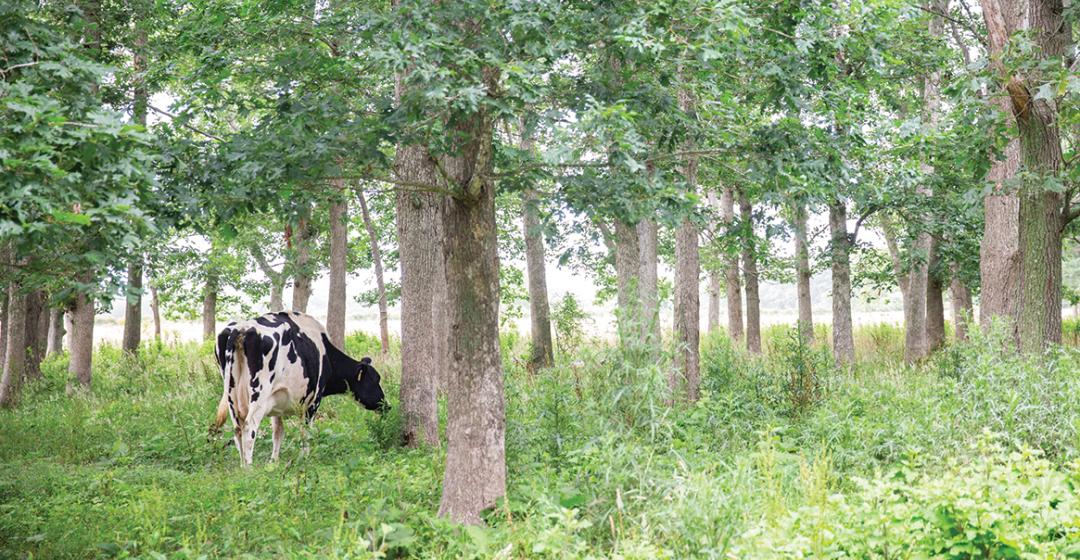


 3 comments
3 comments
Comments (3)